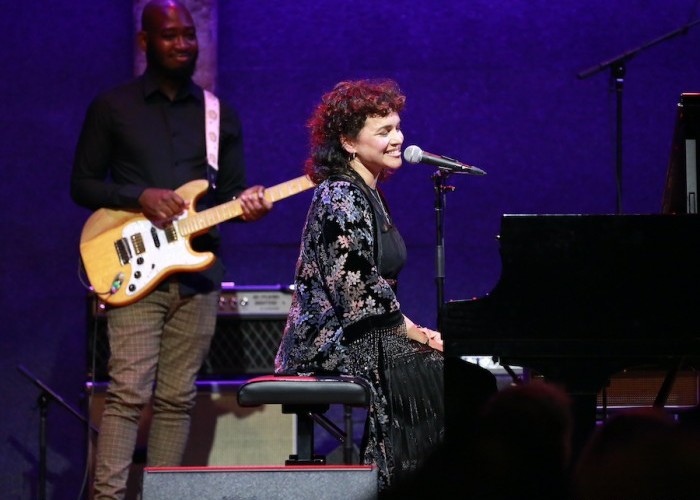Jan 13, 2026 2:09 PM
More Trump-Kennedy Center Cancellations
The fallout from the renaming of the John F. Kennedy Center for the Performing Arts to include President Donald…

Norah Jones performs live, for the first time since COVID-19, during the JFA Gala on June 30.
(Photo: Courtesy Jazz Foundation of America)Midway through the 2021 Jazz Foundation of America Gala on June 30, singer Norah Jones took her seat at the piano, the smattering of sequins on her jacket glinting here and there in the lights of the City Winery stage. “It’s my first gig,” she said with a quiet smile, alluding to the recent return of live music.
That Jones would choose the gala — JFA’s biggest annual fundraising event — as her first step onstage since the COVID-19 outbreak speaks of the foundation’s value to the jazz community. And for sure the pull of stars like Jones and the evening’s other luminaries helped. All told, this year’s benefit raised $970,000 — that’s nearly $1 million for music education projects, employment-generating initiatives and financial relief to blues, jazz and roots musicians in need.
It was fitting that Jones played from Begin Again, her 2019 release for Blue Note, given the abrupt interruption of the album’s North American tour last year. There was something soothing in her pared-down take on the album’s title cut, a strophic alt-rock tune, and the throaty “It Was You,” a ballad drenched in Jones’ signature longing. These two, along with her breakout hit from 2002, “Don’t Know Why,” recalled the romanticism of carefree human interactions — walking on beaches, riding in cars, sitting in audiences. In listening to Jones, it’s hard not to feel nostalgic.
In part, though, the evening is about nostalgia. Each year the JFA acknowledges two jazz greats with lifetime achievement awards; this year saxophonist George Coleman and trombonist Slide Hampton took the honors. Actor Danny Glover and producer Sandy Jordan, both JFA board members, presented the first award to Coleman, an NEA Jazz Master and alumnus of the Miles Davis Quintet.
Before accepting, Coleman led his smart rhythm section (pianist Emmett Cohen, bassist Peter Washington and drummer Joe Farnsworth) through two tunes before segueing into a subtly swinging “New York, New York” — this last in a nod to the audience.
“You, the fans, are unbeatable,” he remarked.
The Grammy-winning Hampton, too, fronted an ace ensemble (pianist George Cables, bassist Rufus Reid, drummer Steve Jordan and trumpeter Jimmy Owens) on the evergreen “Four,” sharing smooth harmonies and crisp solos with Owens and the rhythm section. (Like Coleman, Hampton and Owens are also NEA Jazz Masters.)
In and around the gala’s official business, short, pithy sets drove the pace of the evening. Harpist Brandee Younger and bassist Dezron Douglas, an uncommon duo of disarming charisma, opened the event with their contemporary take on Alice Coltrane’s “Gospel Trane.” Later, a Slide Hampton Tribute band — Hampton’s aforementioned rhythm section plus a finely honed trombone quartet (Clifton Anderson, Steve Davis, Robin Eubanks and Steve Turre) — offered up Hampton’s rich arrangement of a J.J. Johnson tune, “Lament.”
And last, pedal steel guitarist Robert Randolph closed the gala with select arrangements for large ensemble: a gorgeously twanging “Going Down,” the gospel-rock dynamo “Baptize Me,” the soulful Chicago blues “Red House” and the rambunctious “Hey Pocky A-Way.”
Throughout the evening, too, the JFA projected quick videos on screens behind the stage, with greetings from the JFA leadership, celebrity reminiscences about the honorees, and historical clips of standout performances. Most poignantly, a memorial video filmed during Mardi Gras in New Orleans this year paid tribute to the scores of jazz musicians lost to the pandemic, including JFA supporters such as guitarist Bucky Pizzarelli, percussionist Ray Mantilla and trumpeter Wallace Roney.
“The human toll of COVID was devastating,” noted Joe Petrucelli, JFA executive director, in introducing the segment. “We lost a lot of friends.”
In response to the crisis, in March 2020 the JFA originated the COVID-19 Musicians Emergency Fund to provide direct financial support to musicians whose livelihood was undercut by the pandemic. Since the Fund’s inception, the JFA has lent assistance to more than 2,000 musicians throughout the United States.
“Our mission is to save the music, one musician at a time,” said Jarrett Lilien, JFA president, in comments to the donors. “We don’t just look to fix the problem, we look to become family. We look to bring love and creative solutions that improve the lives of hardworking people who have already contributed so much to making this world a better place.”
On Aug. 18, the JFA presented Spotlight Jazz, an abridged video recording of the gala, for 24 hours via its website. All donations from the virtual concert will benefit the COVID-19 Musicians Emergency Fund. To donate, go to jazzfoundation.org. DB

Belá Fleck during an interview with Fredrika Whitfield on CNN.
Jan 13, 2026 2:09 PM
The fallout from the renaming of the John F. Kennedy Center for the Performing Arts to include President Donald…

Peplowski first came to prominence in legacy swing bands, including the final iteration of the Benny Goodman Orchestra, before beginning a solo career in the late 1980s.
Feb 3, 2026 12:10 AM
Ken Peplowski, a clarinetist and tenor saxophonist who straddled the worlds of traditional and modern jazz, died Feb. 2…

The success of Oregon’s first album, 1971’s Music Of Another Present Era, allowed Towner to establish a solo career.
Jan 19, 2026 5:02 PM
Ralph Towner, a guitarist and composer who blended multiple genres, including jazz — and throughout them all remained…

Rico’s Anti-Microbial Instrument Swab
Jan 19, 2026 2:48 PM
With this year’s NAMM Show right around the corner, we can look forward to plenty of new and innovative instruments…

Richie Beirach was particularly renowned for his approach to chromatic harmony, which he used to improvise reharmonizations of originals and standards.
Jan 27, 2026 11:19 AM
Richie Beirach, a pianist and composer who channeled a knowledge of modern classical music into his jazz practice,…